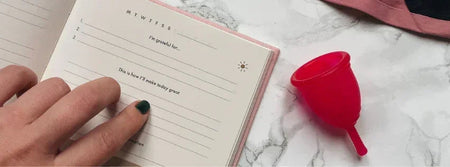Whether your period is early or late, there are a myriad of explanations as to why your period cycle might be slightly thrown off. During these times it can be worrying, and often stressful, as you can't predict when it might arrive.
But, don't panic, this is really common!
It can be a big help to understand how the cycle works to ease your worries - after all, stress and worry can delay your period even further - we'll go into this later.
 Understanding your cycle
Understanding your cycle
Understanding the basics of your cycle is a great starting point to help you spot any patterns or irregularities. Everyone's menstrual cycle is different and even if you have regular periods, it's common to experience the occasional fluctuation, this is usually nothing to worry about.
But, to break it down...
The length of your average menstrual cycle is 28 days, but cycles from 23 to 35 days are also absolutely normal.
There are four main phases to the menstrual cycle:
- Menstruation - this is where the uterus sheds its lining, resulting in menstrual bleeding. This usually lasts around 3-7 days.
- Follicular Phase - follicles in the ovaries begin to develop. One follicle matures and releases an egg during ovulation.
- Ovulation around halfway through the menstrual cycle, the mature egg is released from the ovary and travels down the fallopian tube. This is the most fertile phase of the menstrual cycle.
- Luteal Phase happens after ovulation, where the ruptured follicle produces progesterone to prepare the uterus for potential implantation of a fertilised egg. If fertilisation has not occurred, your hormone levels will decline leading to the onset of menstruation and the start of a new cycle.
What is considered a late period?
If menstruation has not occurred after 35 days, it is considered a late period.
How many days late can a period be?
-
Up to 5–7 days late: It’s generally considered normal for a period to be a few days late.
-
More than 7 days late: If your period is more than a week late, it is considered late and may be worth investigating.
Factors that can delay your period
The first thing that often comes to mind when a period is late is pregnancy. However, that isn’t the only factor that can cause a late period. If you’re anxiously awaiting your next period and feel that a potential pregnancy could be a possibility, the best solution is to pick up a test to put your mind at ease. Aside from that, there are many factors that can disrupt your menstrual cycle. Let’s take a look at some of them:
- Can stress cause a period to be late?
Stress is a very common culprit as it can disrupt the delicate balance of hormones involved in the menstrual cycle.
High levels of stress can delay ovulation, in turn causing a late period. This can create a particularly tense situation if you are anxious about a late period, no doubt causing these stress levels to rise even more and make things worse.
Learning stress management techniques can be a big help in these scenarios, meditation, yoga, or relaxation exercises can really help to mitigate the impact of stress on your hormone levels.
- Can exercise cause a late period?
Whilst regular exercise has a huge amount of positive benefits to your overall health, excessive exercise and over-exerting yourself can have the opposite effect.
So, ensure that you are fuelling your body properly for your workouts. It's also important to take enough rest days in between.
- Can gaining weight make your period late?
Gaining weight can also impact your menstrual cycle, particularly if it results in obesity. Excess fat tissue produces more estrogen, which can disrupt the balance between estrogen and progesterone. This hormonal change may cause delayed or irregular periods.
- Can the flu make your period late?
Yes, the flu can affect your menstrual cycle. Illness stresses the body and hormones, which can delay ovulation and cause a late period. You might also notice stronger cramps or other period symptoms.
- Can a UTI cause a late period?
A urinary tract infection (UTI) does not directly cause a late period. However, the stress, discomfort, and inflammation associated with the infection can affect your body’s hormones, which may temporarily disrupt your menstrual cycle and lead to a delay.
- Can antibiotics cause a late period?
Antibiotics do not directly cause a late period. However, medications containing hormones, such as hormonal birth control or hormone therapy, can affect your cycle by altering the hormones that regulate it. Other drugs, including certain antidepressants and antipsychotics, have also been linked to menstrual changes.
- Other period-disrupting factors include:
- Travel
- PCOS (Poly Cystic Ovary Syndrome)
- Endometriosis
In some cases, a late period may be a sign of an underlying medical condition that requires attention. If your period is consistently late or irregular, or if you experience other concerning symptoms, it's essential to consult a healthcare provider.
So what should I do if my period is late?
Ultimately, a late period can be caused by a range of factors - but they are common and usually shouldn’t be a cause for concern.
We would recommend keeping a pair of our period panties so that when your period does show up you’re already prepared and won’t have the added stress of being caught off-guard.
How to get a late period to start
If your period is slightly late and pregnancy or medical conditions have been ruled out, there are a few natural ways to help your body relax and possibly encourage menstruation:
- Reduce stress: High stress can affect your hormonal balance. Try relaxation techniques such as meditation, deep breathing, or yoga.
- Gentle physical activity: Light exercise like walking, stretching, or jogging can promote overall hormonal balance and blood circulation.
- Apply warmth: Using a heating pad on your lower abdomen or taking a warm bath may help relax uterine muscles and increase blood flow.
- Sexual activity: Orgasms can cause uterine contractions, which sometimes help trigger a delayed period.
- Balanced nutrition: Some foods and herbal teas, like pineapple, papaya, ginger, or chamomile, are traditionally believed to help induce menstruation, due to their effect on hormone levels.
In conclusion:
Try to remember that slight variation in your cycle is entirely normal, your body might be adapting and responding to external factors and your period will show up.
However:
If you’re noticing persistent irregularities, unusually heavy or prolonged periods, severe pain or irregular bleeding you should always speak to your doctor to check for any underlying causes.
Written By Valentina Carrara
Valentina has been part of the Ruby Cup team for many years and is our go-to expert on menstrual cups. With plenty of knowledge and experience, she’s passionate about helping people understand how menstrual cups work (Ruby Cup is her favourite period product after all!) and why they’re a great option. If you have any questions or doubts, she’s always happy to help: Just drop her a message at hello@rubycup.com.










